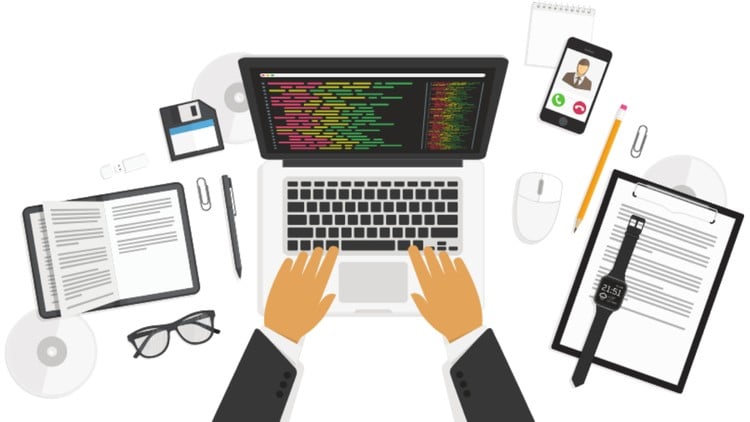
Engineer’s Playground. (The Ultimate Journey For Computer Engineering)
⏱️ Length: 46.1 total hours
⭐ 4.46/5 rating
👥 23,175 students
🔄 September 2025 update
Add-On Information:
Note➛ Make sure your 𝐔𝐝𝐞𝐦𝐲 cart has only this course you're going to enroll it now, Remove all other courses from the 𝐔𝐝𝐞𝐦𝐲 cart before Enrolling!
- Course Overview: Unveiling the Engineer’s Playground
- This comprehensive ‘Computer Engineering Mastery’ course transforms curious beginners into adept professionals, offering a holistic perspective on the intricate interplay between hardware and software, the bedrock of modern computing systems.
- Embark on an expedition from silicon’s fundamental principles to architecting complex digital systems. The curriculum demystifies core components and their synergistic functions, fostering appreciation for technological ingenuity.
- Beyond identification, the course delves into design philosophies and operational mechanics, fostering systems-level thinking. Explore computing’s evolution, recognizing historical milestones and anticipating future trends.
- Engage with practical, real-world engineering challenges, cultivating critical analytical skills to diagnose, innovate, and optimize across various computer engineering domains.
- Discover the art of integrating disparate technologies, bridging abstract computational models with tangible electronic implementations. Build intuition and confidence in tackling complex technical puzzles from the ground up.
- Requirements / Prerequisites: Your Launchpad to Engineering Excellence
- Crafted for aspiring engineers and tech enthusiasts, this course requires little to no prior experience in hardware design or advanced programming. A curious mind and eagerness to unravel technology’s mysteries are your prime assets.
- Basic computer literacy, including operating systems, file management, and internet navigation, is expected for smooth engagement with materials and practicals.
- A fundamental understanding of high school-level mathematics, especially basic algebra and logical reasoning, will aid navigation through digital logic and circuit analysis.
- Access to a reliable computer (desktop or laptop) with an internet connection is essential for lectures, virtual labs, and running software. Minimal hardware requirements will be outlined.
- No prior knowledge of electronics, circuit design, or programming (Python/Assembly) is expected. The course starts with foundational concepts, building progressively for true beginner accessibility.
- Skills Covered / Tools Used: Architecting the Future, One Skill at a Time
- Digital System Design & Implementation: Develop proficiency in designing, analyzing, and synthesizing digital logic circuits, translating high-level system specifications into functional hardware implementations.
- Computational Thinking & Algorithmic Problem Solving: Sharpen your ability to break down complex problems, devising efficient algorithms and implementing them through structured Python programming.
- Hardware-Software Interface Programming: Master interacting directly with hardware, understanding how software instructions translate to physical actions, and designing optimized code for specific architectures.
- Circuit Analysis & Electronics Prototyping: Learn to analyze fundamental electronic circuits, predict behavior, and prototype simple circuits using virtual simulation environments and foundational components.
- Data Representation & Manipulation: Understand how various data types are represented, stored, and processed within a computer system, from binary numbers to complex structures, and manipulate them efficiently.
- Engineering Documentation & Debugging: Cultivate systematic approaches to documenting designs, troubleshooting hardware/software issues, and employing effective debugging strategies to identify and resolve faults.
- Tools Utilized: Engage with industry-standard Python IDEs, specialized digital logic simulation software for circuit design, and virtual breadboarding tools for hands-on electronics exploration.
- Benefits / Outcomes: Your Pathway to Computer Engineering Expertise
- Career Readiness: Graduate with a robust skill set for entry-level positions in embedded systems design, hardware development, firmware engineering, test engineering, or roles requiring strong hardware-software co-design understanding.
- Foundational Expertise: Establish an unshakable foundation in computer engineering principles, providing the knowledge base for advanced academic degrees or specialized certifications.
- Innovative Prototyping Ability: Gain confidence and practical skills to conceptualize, design, and prototype basic electronic and computational solutions, fostering an innovative mindset.
- Understanding Modern Computing Architectures: Develop a profound understanding of how modern computers function, enabling intelligent evaluation and contribution to next-generation computing system design.
- Enhanced Problem-Solving Acumen: Significantly improve analytical and problem-solving capabilities, applicable to technical challenges and broader logical/strategic thinking in professional contexts.
- Cross-Disciplinary Insight: Bridge electrical engineering and computer science, equipping you with a unique, highly valued perspective in collaborative technological development.
- Empowered Independent Learning: Build self-assurance and a methodological framework to continue learning and adapting to the evolving technological landscape, ensuring relevant and cutting-edge skills.
- PROS: Why Choose This Mastery Journey?
- Comprehensive & Structured Curriculum: Delivers a well-organized learning path from absolute basics to advanced concepts, making the transition smooth and logical.
- High Student Satisfaction & Engagement: Evidenced by a strong 4.46/5 rating and a large community of over 23,000 students, indicating a proven track record of successful learning outcomes.
- Practical & Application-Oriented Learning: Integrates hands-on labs and real-world examples, ensuring theoretical knowledge is reinforced with practical application.
- Industry-Relevant Skill Development: Focuses on skills that are directly applicable and highly sought after in today’s computer engineering job market.
- Flexible Self-Paced Learning: Allows students to learn at their own convenience, fitting into diverse schedules without compromising on depth or quality.
- Strong Foundation for Future Growth: Equips learners with the core principles necessary for continued specialization or further academic pursuits in computer engineering.
- CONS: A Consideration
- While aiming for ‘Mastery’ from ‘Beginner’ in 46.1 hours is ambitious, learners might find the pace intensive if they are entirely new to technical subjects, requiring significant self-discipline and commitment to fully absorb all the intricate details presented.
Learning Tracks: English,IT & Software,Other IT & Software
Found It Free? Share It Fast!